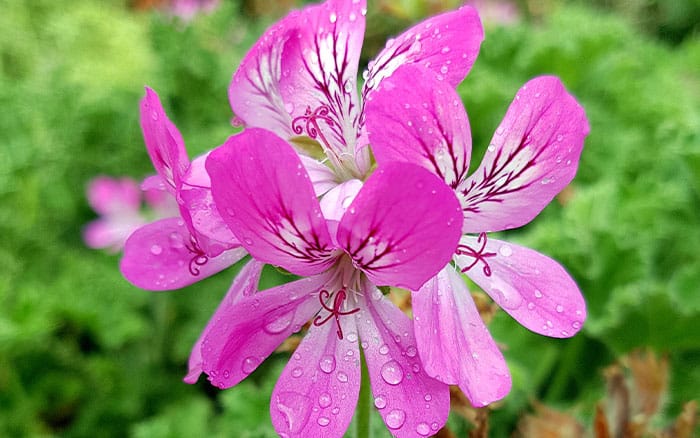Send a smile by giving a plant as a get well soon to a loved one. Lots of studies have been carried out on the benefit of plants to our health and wellbeing and some doctors believe that placing plants in the vicinity of people who are sick or recovering from illness can help their recovery.
If you know somebody who’s unwell or seasonally sad, giving them a plant shows you care and might speed up their recovery by lifting their mood.
Giving a plant is like sending a smile and here are my suggestions of plants to give your friend or loved one a big dose of happiness….
Pelargonium ‘Lady Plymouth’ (scented leaf pelargonium)
We’re all familiar with bright red flowering pelargoniums but have you considered a scented leaf variety as a gift? You’ll be amazed at the great range of scents; peppermint, strawberry, lemon, rose and even one that smells like turkish delight!
Rubbing the leaves releases the scent and can be a wonderful tonic for anybody at any time of the year as the good news is, they’re evergreen.

‘Lady Plymouth’ is a very pretty variety with her cream edged variegated, rose scented leaves and pale lavender flowers. All varieties of scented leaf pelargoniums make great patio plants during the summer.
However, they’re not frost hardy, so this makes them the ideal choice for having inside the house or conservatory during the cold winter months.
Codiaeum variegatum ‘Petra’ (croton)

This colourful houseplant is a mood enhancer in all senses of the word as, not only does it have stunning coloured glossy leaves with multi colour streaks, but it could also help purify the home by filtering out common toxins.
It does appreciate regular misting to keep it looking its best so this could be a good choice for somebody who needs to be at home but is well enough to move around the house.
Phalaenopsis (moth orchid)
The beauty of orchids is that you can find one in flower any time of the year and they’re relatively inexpensive. The flowers come in a range of colours from soothing, elegant white, to bright, cheerful shades of pink and purple and what’s more last for as long as 12 weeks!
You can choose from four main types. The easiest one to look after is the moth orchid as it’s less fussy about its watering needs.

You’ll easily recognise it by its wide, flat, floppy leaves and will perform best if placed on a pebble tray in a brightly lit centrally heated room.
Narcissus papyraceus (paper-white daffodils)

Scented bulbs like hyacinths and Narcissus make great, cheerful, long lasting winter gifts with the added bonus that, when the bulbs have finished flowering, they can be planted outside in the garden.
The group of daffodils known as ‘paper-whites’ are covered in small, pure white, highly scented flowers in late winter and early spring.
Also, if you want to make the gift extra special, place the pot in a pretty container and dress around the top of the container with moss.
Mimosa pudica (sensitive plant)
If a child or teenager is unwell these are great plants for the child to ‘give a tickle’ to! They’ll be fascinated by how responsive the leaves are when touched as the leaves fold inwards and then open up again about half an hour later.
The leaves also close at night which gives the plant its other name of ‘the sleepy plant’.

Rosa RosAroma ‘Bright Pink’ (miniature rose)

There’s nothing like the soft scent of a rose to cheer somebody up and help them relax. Miniature roses are widely available, but the flowers often have no scent so the great thing about the RosAroma group of miniature roses is that the flowers are heavily scented.
They come in a range of light pastel colours and can also be placed outside on a patio, although they’re more likely to flower for longer if placed inside the house.

Leave A Comment